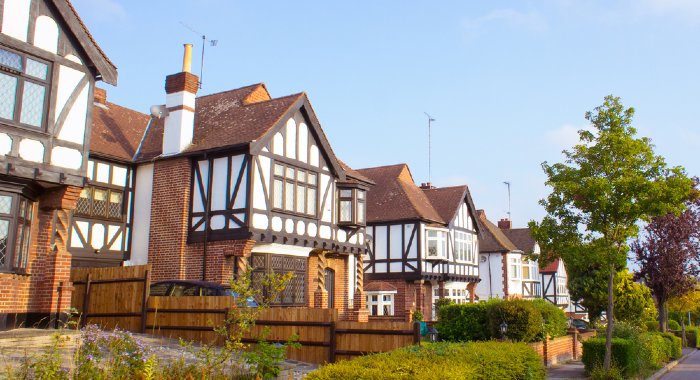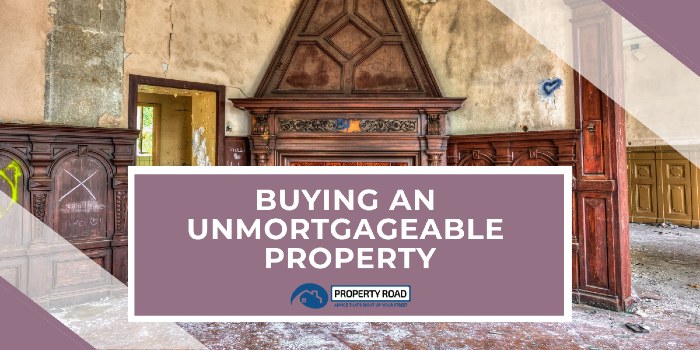When buying a house in the UK, there may be opportunities that appear to be an incredible bargain, but you may be faced with the issue of buying an unmortgageable property.
But what, exactly, is an unmortgageable property, and is it worth the risk of buying one?
Here, we take a closer look at the process and the potential pitfalls of investing in an unmortgageable home.
What do I need to know about buying an unmortgageable property?
For many people, buying an unmortgageable property is a risky process that involves finding a suitable property, securing alternative finance and dealing with potential legal and structural issues.
The Propertyroad.co.uk team takes a closer look at the process below, but here is a brief overview of what is involved:
- An unmortgageable property is a property that cannot be bought with a traditional mortgage from a high street lender – the reasons include structural defects, short leases, planning issues and environmental hazards
- These properties are often advertised by specialist estate agents, auctioneers or direct home buying firms and advertised as ‘cash buyers only’ or ‘suitable for investors’
- Since a traditional mortgage is not an option, buyers need to find alternative sources of finance including cash, a bridging loan or a specialist lender.
- Buying an unmortgageable property can be a lucrative investment, but it also comes with significant risks and challenges, including legal issues, structural issues, financial issues and market issues.
There’s no doubt that buying an unmortgageable property is not for the faint-hearted, but it can be a rewarding venture for those who are willing to take on the challenge.
Before buying an unmortgageable property, it is advisable to do thorough research, seek professional advice, and weigh up the pros and cons carefully.
And the first step is understanding what it is that makes a property ‘unmortgageable’.
Buying A Property? FREE Step-By-Step Platform
What makes a property unmortgageable?
The first issue to confront is to understand what makes a property unmortgageable.
Obviously, a derelict building will not attract a mortgage, but neither will properties that don’t have a bathroom or kitchen and neither will those that have structural defects of any kind. For example, houses or flats with dry or wet rot and damp.
We ourselves experienced the disappointment of trying to buy an unmortgageable property when our lenders survey highlighted structural issues with the property.

We had seen a few cracks but didn’t think they were anything too serious. The surveyor thought otherwise and it turned out the extension had been built on a single brick garage wall. As a result, the mortgage company wouldn’t touch it – they wouldn’t even consider lending us less or putting a retention on it. They just wouldn’t lend on that property, full stop!
You may also find a property that is too close to mine works, even if the mine is no longer working, along with areas of landfill and areas that may have recently flooded.
Those are serious issues for a mortgage lender to consider but there are also other problems that need flagging up including properties with:
- A planning application that has been incorrectly applied
- Boundary disputes
- A short leasehold, usually for less than 70 years
- A defective lease
- Significant repairs needed
- The need to be demolished
- Non-standard construction
- A sitting tenant or be subject to regulated tenancy
- The presence of Japanese knotweed
Finally, another reason why a property may be unmortgageable could be simply down to value. For example, some lenders have a mortgage threshold in place, which is the amount they are prepared to lend above, and this figure can be as low as £50,000.
In some areas of the UK, you can buy a home, usually a terrace or a flat, for less than that, though it may need considerable decorating and repair before you move in.
What does it mean when it says cash buyers only?

Regardless of a property’s condition, the seller will look to advertise it and may highlight that it is suitable for cash buyers.
But there will be potential buyers wondering, ‘What does it mean when it says cash buyers only?’
Essentially, the seller is looking for a buyer who will be able to buy without the help of a mortgage, or in some cases, a loan.
However, not everyone appreciates what the term ‘cash buyer’ actually means.
Put simply, the buyer must have the cash in place when they put in an offer – if you are selling a property and want to use the equity or profit from it to buy another property, then you are not a cash buyer.
Also, some home sellers advertise for cash buyers because they’re looking for a quick sale rather than having a buyer who needs to apply for a mortgage – which can take several months to complete.
Whether you have the cash in place or not, it’s always a good idea to have a chartered surveyor undertake a survey of the property to highlight what the actual problems are with it.
Their report will highlight the problems and you can calculate how much they will cost to fix rather than having any unexpected surprises appearing later.
The unmortgageable property we tried to buy ended up being relisted as a ‘cash only’ sale due to the issues we had faced. The vendors knew the issue would likely come up again if someone else tried to get a mortgage on it so they decided to only entertain interest from cash buyers.
Getting mortgages for unmortgageable properties

So, we have looked at what an unmortgageable property is, but how can you get a mortgage for an unmortgageable property?
This is an interesting question because bargain hunters do love to find homes that have ‘potential’.
Not only will they have the funds to renovate, but the fact that it’s an unmortgageable property will put off competing buyers if they can’t access finance.
We would have loved to still complete the purchase of the unmortgageable property we found if we could. We were willing to pay for the work that needed to be done, but in order to do that, we still needed the mortgage to buy the property in the first place.
We asked the mortgage lender if they would lower the valuation to factor in the issues, or perhaps add a ‘retention’ where they withhold some funds until the work had been completed.
The property was under our maximum budget so we had funds to play with to do the work – providing we could access the funds to buy the property in the first place!
While this is often a solution, our mortgage lender unfortunately refused. Because the property had structural issues, they weren’t willing to make any allowances and flat out refused to compromise. We were left with no option but to pull out of the purchase.
Of course, if you have cash, then you can fix the problems to get it into a condition that will attract a mortgage.
There are mortgage brokers available who are able to find a lender willing to offer a mortgage on a refurbished property.
But there are no lenders offering a mortgage for a unmortgageable property.
Access a bridging loan
However, you could access a bridging loan – the process is much quicker than for a mortgage and the lending criteria are different.
This is a popular route for developers buying at auction but even when you do refurbish a property you will need to find a mortgage lender that is willing to lend to an inexperienced applicant.
Unless you have a track record in property development, they will see you as being very high risk as a borrower.
Most mortgage lenders also operate within strict lending criteria and the process can take a long time to complete.
However, there are independent finance groups and private banks who aren’t so restricted in their lending and they may consider a finance application on its merits. They may even lend to inexperienced buyers.
There is no set rule as to how much this type of borrowing will cost, though you will need an experienced mortgage broker with lots of detailed knowledge to access the range of potential financial products available.
And even if you do find a lender willing to lend, you’ll still need to have cash because the loan-to-value (LTV) will certainly not be 100%.

The risk of buying an unmortgageable property
We began this article asking whether it is worth the risk of buying an unmortgageable property – and the answer is ‘Yes’. And ‘No’.
It’s ‘Yes’, if you have the cash to buy outright or to help pay for the purchase price and renovations, along with the lender’s fees, and it’s ‘No’ if you can’t access this cash.
There is an inherent risk when it comes to buying an unmortgageable property – and the clue is right there.
Mortgage lenders always look to reduce their risk and if there was no risk in buying such homes, then they would offer a slew of products.
But they don’t, so this part of the property buying market is for those with cash (and lots of it!) and the right attitude to risk taking. Good luck!





